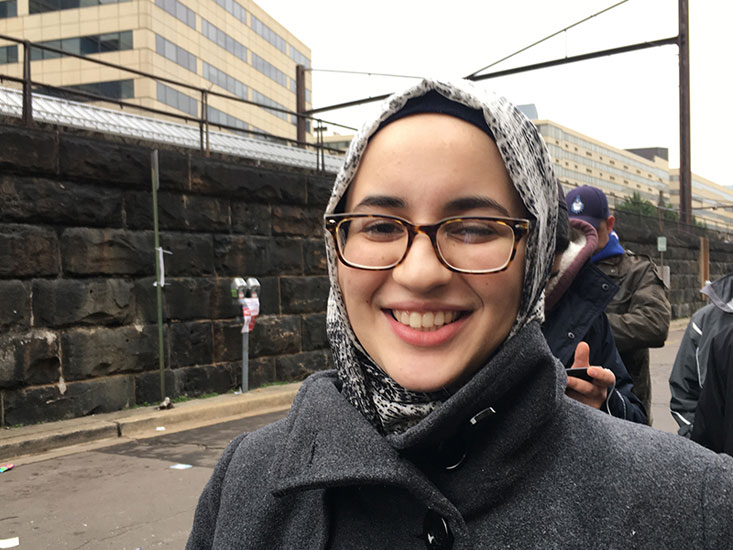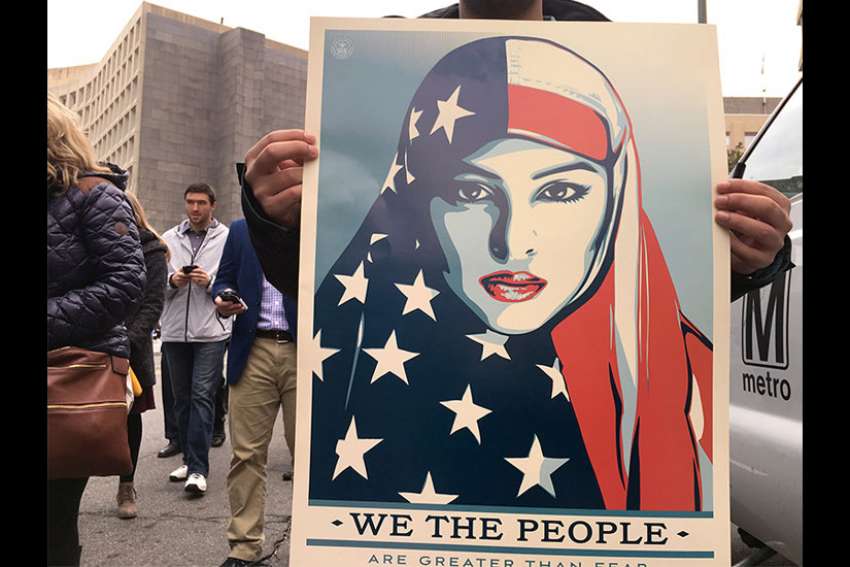But the 23-year-old, hijab-wearing Brooklynite wanted to be at his swearing-in. She stood in a security line for hours, surrounded by Trump supporters, because she had a message deliver. Simply put: Here I am.
"I want people to see me," Ktiri said.
Just by showing up as a visibly Muslim person, she said, she reminds people that Muslims are part of the fabric of America. Donald Trump talked about Muslims on the campaign trail. Well, said the New York University graduate, here is one of the people he was talking about.
"I live in this country too and just because you don't see me everyday doesn't mean I don't exist," Ktiri said.
But she actually wanted more than to be seen. She wanted to engage.
Though Ktiri approached no one directly, she made eye contact, and kept her face open and friendly. She intended to make it clear that anyone could start up a conversation. She was hoping for questions about why she came, about Islam — anything.
There were no takers. Still, standing in an endless line heading toward the National Mall on Inauguration Day, she felt she accomplished something. "My presence is a present," she said, quoting a Kanye West song.
And like hundreds of people in downtown Washington Friday (Jan. 20), Ktiri's hours of waiting in line brought her closer to the Mall, but not close enough to pass through security in time to view the inauguration, where Trump drew cheers after he promised to eradicate “radical Islamic terrorism.”
She and her small group of friends — none of the others' religion was identifiable — watched a live-stream of the inauguration on their phones not far from the National Air and Space Museum.
Ktiri, a Moroccan-American raised in a Detroit suburb, said that while disappointed that no one engaged her on Inauguration Day, neither was anyone mean to her.
 Baraa Ktiri, 23, from Brooklyn in Washington, D.C., on Jan. 20, 2017. (RNS photo by Lauren Markoe)
Baraa Ktiri, 23, from Brooklyn in Washington, D.C., on Jan. 20, 2017. (RNS photo by Lauren Markoe)
That's not always been the case. Since she started wearing the hijab as a young girl, people have hurled anti-Muslim slurs at her, and tried to pull the sign of Islamic piety off her head.
She said she understands, though, why nobody talked to her. Many people who came to the inauguration may never have met a Muslim before, and talking to her would have put them out of their comfort zones.
Not far from where Ktiri waited in line sat Olga Smith, a Trump supporter from Houston taking a moment's rest on a bench. She identified herself as a Catholic, "pro-life" voter who supported Trump from the very beginning of his campaign.
Smith, 72, said she believes Muslims like everyone else in this country have a right to worship as they like, and she wasn't fearful that Trump would restrict their rights.
"There are lots of good Muslims," she said. "I don't have nothing against Muslims in America as long as they're not terrorists."
Told of Smith's comments after the inauguration, Ktiri — who voted for Bernie Sanders in the Democratic primary and Jill Stein in the general election — said even well-meaning people can hold stereotypical views. For those who have been prejudiced for a long time, she added, it could take some time to change their minds.
"One conversation is not going to do it," she said.
Was Ktiri nervous about showing up in her hijab to an inauguration so packed with people who voted for a man who called for a registry of Muslims, and took counsel from a general who called Islam a "cancer"?
"No, this is nothing new," she said, explaining that she's been the lone, obviously Muslim person in groups before.
What about her parents? Were they worried about her?
Again no, though she does have a non-Muslim friend who didn't tell her parents she was coming to Washington this week for fear they would panic.
"Since I was a kid my parents were always taking us to protests, various justice causes," said Ktiri, who also plans to attend the Women's March on Washington Saturday.
Just the other day her mother encouraged her and her friends to go to a protest organized by filmmaker Michael Moore.
"He's from Michigan too," her mother told her. "Go tell him you're from Michigan!"


